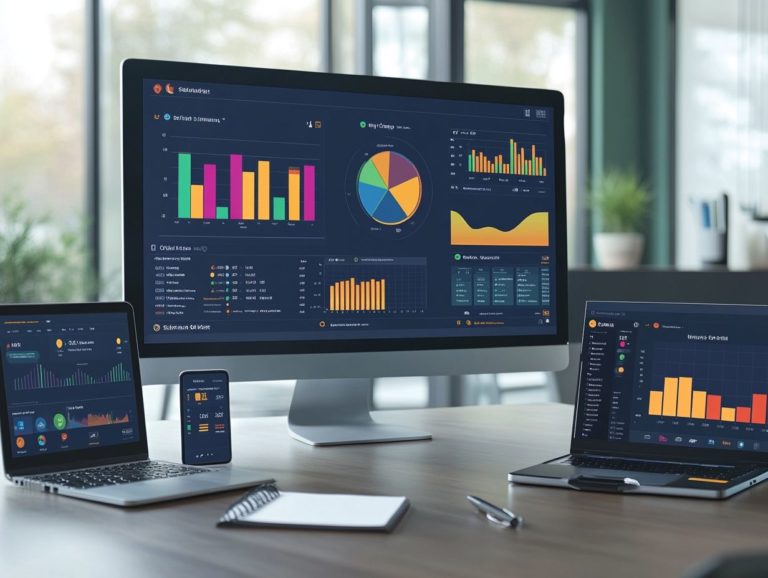How Does CRM Software Work?
In today s fast-paced business landscape, mastering effective customer relationship management is not just important; it’s a game-changer for your success. CRM software is a pivotal tool that streamlines your interactions and elevates customer satisfaction.
This article delves into what CRM software entails, showcasing its key features, including customer data management, sales automation, and robust reporting capabilities. It explains the mechanics behind it, from organizing data to implementing automated workflows, while also discussing the substantial benefits it provides, such as enhanced relationships and informed decision-making.
Jump in and discover how CRM can revolutionize your business!
Contents
Key Takeaways:

CRM software helps businesses manage customer data and automate sales and marketing processes, ultimately improving customer relationships and business insights. To effectively implement this technology, it’s crucial to know how to get started with CRM software. Through data collection, organization, and integration with other systems, CRM software helps businesses streamline processes and increase efficiency and productivity.
Key features of CRM software, such as customer data management and reporting and analytics, provide businesses with the tools to make better decisions and improve overall performance.
What is CRM Software?
Customer Relationship Management (CRM) software is an essential asset for you as a business owner, allowing you to track communications, manage leads, and cultivate meaningful relationships with your clients.
In today s competitive market, grasping customer data is essential for enhancing their experience and driving your sales success. Whether you opt for established solutions like Salesforce and HubSpot or invest in a custom CRM, these tools offer automation, organization, and integration capabilities that streamline your business processes and maximize efficiency.
Think of these systems as your centralized data hubs, making it effortless for your team to access real-time insights on customer interactions and preferences.
Focusing on customer interactions can enhance your sales funnel, facilitating not just lead generation but also thorough performance analysis. This leads to seamless follow-ups and knowledge-based decision-making across various functions be it marketing, sales, or customer service.
Ultimately, robust CRM software gives you the power to build stronger, data-driven relationships with your clients, fostering loyalty and driving sales growth.
Key Features of CRM Software
CRM software is designed with essential features that give you the power to manage customer relationships more effectively. To maximize its potential, it’s important to understand CRM software best practices. You’ll find tools for customer data management, sales automation, and marketing automation at your fingertips.
These capabilities enable your sales team to streamline workflows, meticulously track customer interactions, and elevate efficiency throughout the sales process.
By selecting the right CRM solution, you can uncover valuable customer insights, nurture leads with finesse, and foster enduring customer loyalty.
Customer Data Management
Customer Data Management is an essential feature of CRM software that gives you the power to efficiently store, organize, and analyze customer information. This includes efficiently tracking customer interactions across emails, social media, and direct communications, allowing you to engage with clients in a more personalized manner.
When you effectively manage customer data, you not only enhance the customer experience but also improve decision-making in your sales and marketing strategies.
By leveraging the capabilities of CRM tools, you can streamline the data retrieval process, making it quicker and easier to access valuable analytics that unveil customer preferences and behaviors. This approach lets you segment and target specific customer groups, enriching your marketing campaigns and nurturing stronger relationships.
Integrating advanced analytics in your CRM lets you predict future trends and adapt your strategies accordingly, paving the way for sustained engagement and loyalty.
Don’t wait! Transform your customer relationships today with CRM software.
Sales and Marketing Automation
Sales and Marketing Automation is an essential feature of CRM software that streamlines your sales funnel and boosts productivity within your sales team. By automating manual tasks and workflows, you can focus on nurturing leads and enhancing client engagement, ultimately driving customer retention and loyalty.
With robust features that seamlessly integrate marketing technology and customer insights, CRM solutions give you the power to execute your marketing strategies more effectively. This approach simplifies your sales process and enhances lead management by prioritizing prospects based on their behavior and engagement levels.
As customer data is automatically collected and analyzed, your sales team can adapt its strategies in real-time, ensuring that the right individuals receive personalized messaging.
The integration of analytics tools within these systems allows you to track performance metrics effortlessly, helping you make informed decisions. The end result? A more streamlined workflow that increases efficiency and maximizes revenue potential by aligning your sales efforts with marketing campaigns effectively. This means you can start driving customer loyalty today!
Reporting and Analytics

Reporting and analytics are essential components of CRM software that offer you invaluable insights into your sales processes and customer relationships. By harnessing advanced analytics tools, you can effectively assess performance, track sales leads, and refine your marketing strategies based on actionable data.
These features give you the power to delve deeply into data analysis, enabling you to uncover trends and patterns that might otherwise slip under the radar. With robust reporting capabilities at your fingertips, you can evaluate campaign effectiveness and measure customer engagement levels.
This comprehensive perspective enriches your understanding of customer behavior and fosters a data-driven culture within your organization. By regularly analyzing metrics, you can adapt and fine-tune your approaches, ensuring that you meet evolving customer needs while enhancing overall profitability.
How CRM Software Works
CRM software operates by refining how you collect and organize data. To better understand its functionality, you can explore what CRM software is. It automates a range of business processes, from tracking sales to managing customer interactions.
By leveraging customer data effectively, you can establish a centralized database that integrates effortlessly with other systems, thereby enhancing efficiency and optimizing your time management.
This integration is vital for maintaining a competitive edge, enabling your sales team to concentrate on building relationships instead of being weighed down by tedious manual tasks.
Data Collection and Organization
Data collection and organization are essential processes within CRM software that elevate your management of customer interactions and sales leads. By systematically gathering data from various touchpoints, you can craft a comprehensive profile for each customer. To maximize effectiveness, consider implementing best practices for using CRM software, which paves the way for tailored engagement strategies that significantly enhance the customer experience.
This organized method not only simplifies your tasks but also amplifies your overall sales efficiency.
Methods of data collection can include:
- Surveys: Gather insights directly from customers.
- Direct customer feedback: Obtain real-time opinions and suggestions.
- Automated tracking of customer interactions: Monitor behavior effortlessly.
These methods allow you to capture valuable insights efficiently. CRM systems excel at categorizing this information, transforming raw data into structured formats that reveal trends and preferences.
The importance of structured data cannot be overstated; it gives your sales team the power to refine processes, target the right audiences, and anticipate customer needs with precision. Ultimately, this focused approach to customer relations cultivates loyalty and boosts conversion rates, making data an invaluable asset for any business seeking sustainable growth.
Automated Processes and Workflows
Automated processes and workflows in CRM software significantly improve your efficiency and time management by eliminating tedious manual tasks and streamlining operations. For insights on how to choose the right CRM software, this allows your sales teams to focus on high-value activities, such as building relationships and closing deals, rather than getting stuck in repetitive administrative duties.
By ensuring smooth workflows, you can create a more organized sales pipeline that effectively tracks customer interactions. Automation in CRM solutions integrates data from various sources, providing insightful analytics that inform your strategic decision-making.
With features like automatic lead scoring a way to rank potential customers based on their engagement and real-time updates, your teams can prioritize prospects more effectively, ensuring that no opportunity slips through the cracks. Automated task reminders and follow-ups reduce the risk of oversight, enabling your representatives to maintain consistent communication with clients.
Ultimately, these features contribute to a more agile sales environment, improving productivity and driving results as your teams adapt swiftly to ever-changing market demands.
Integration with Other Systems
Integration with other systems is a crucial feature of CRM software, allowing you to connect your tools with various marketing technologies and platforms. This integration allows customer data to flow smoothly between systems, giving your sales team comprehensive insights into customer interactions and preferences essential for connecting with clients effectively.
By leveraging these connections, you can streamline workflows, reduce duplication of effort, and enhance the overall user experience. When your CRM software communicates with email marketing tools, social media platforms, and analytics systems, it fosters a unified approach to managing customer interactions.
This gives your teams the power to access real-time insights and encourages collaboration across departments, leading to more informed decision-making and targeted marketing strategies. With a holistic view of customer behavior, your business can tailor outreach efforts, ensuring that your communications resonate effectively and build deeper relationships.
Benefits of Using CRM Software

Utilizing CRM software unlocks a wealth of benefits that can significantly elevate your business performance. To maximize its potential, learn how to set up CRM software for your team. You’ll experience improved customer relationships, increased efficiency, and invaluable business insights.
By meticulously tracking customer interactions and managing sales leads, you can build lasting customer loyalty and retention while fine-tuning your sales processes. These benefits create a better experience for your customers and equip you with actionable insights that drive strategic decision-making.
Improved Customer Relationships
Improved customer relationships stand out as one of the primary advantages of utilizing CRM software, as it allows you to connect with clients in a personalized manner that enhances overall interaction. By effectively managing customer data and tracking your engagements, you can tailor communications to align with individual preferences, significantly boosting customer loyalty and satisfaction.
This personalized approach is crucial for building long-lasting relationships that drive repeat business.
CRM systems empower you to segment your audience based on various factors, enabling targeted marketing strategies that resonate deeply with each client. This level of customization not only improves the relevance of your messaging but also fosters a genuine connection between the customer and your brand.
As you leverage CRM tools to monitor client interactions, you can quickly pinpoint potential challenges and address them proactively. Act now to boost your retention strategies and fortify a foundation of trust.
The result? A more engaged clientele that feels valued and understood, which plays a significant role in driving your overall business success.
Increased Efficiency and Productivity
Increased efficiency and productivity are standout advantages of implementing Customer Relationship Management (CRM) software! This software automates various aspects of your sales process, significantly cutting down the time spent on manual tasks.
By streamlining workflows and enhancing organization, you can allocate resources more effectively and focus on high-priority activities that truly drive results. This boost in productivity means more sales and faster growth!
With CRM tools seamlessly integrated, communication between departments becomes effortless. Your team has access to up-to-date information, essential for making informed decisions.
Automating repetitive tasks like data entry and follow-up reminders frees up valuable time, allowing for more meaningful interactions with clients.
Customized dashboards provide intuitive insights into sales performance and customer behavior, enabling quick identification of trends and necessary adjustments to strategies. The transformative capabilities of CRM software elevate individual productivity and cultivate a culture of collaboration, leading to enhanced organizational effectiveness.
Better Business Insights and Decision Making
Better business insights and decision-making are crucial advantages of CRM software! Its powerful analytics tools deliver in-depth performance analysis that empowers you.
These insights enable you to identify trends, evaluate customer interactions, and refine marketing strategies, leading to informed decisions that significantly enhance overall business performance.
By effectively leveraging data, you position your business to gain a competitive edge and optimize sales cycles. The analytics features within CRM systems allow you to delve into customer behavior, uncovering patterns that might not be immediately apparent.
This understanding helps tailor services to meet customer needs, essential for fostering loyalty. By closely monitoring key performance indicators, you can pinpoint areas ripe for strategic improvement, ensuring efficient resource allocation.
As a result, you can anticipate customer demands and adapt swiftly to market changes, ultimately driving long-term success and growth for your business!
Frequently Asked Questions
How does CRM software work?

CRM software collects, organizes, and manages customer data in one centralized location. To maximize its effectiveness, it’s important to understand what features CRM software should have as it uses this data to help businesses build and maintain customer relationships, improve service, and increase sales.
What types of data does CRM software collect?
CRM software collects various customer data, including contact information, purchasing history, communication preferences, and interactions with the company. To get the most out of this tool, it’s important to learn how to optimize CRM software usage. It can also track customer behavior and engagement on social media and other online platforms!
How does CRM software benefit businesses?
CRM software benefits businesses by improving customer retention, increasing sales, and streamlining communication and marketing efforts. Additionally, learning how to use CRM software for surveys allows for a better understanding of customers and personalizes interactions for a more positive experience!
Is CRM software difficult to use?
While each CRM software may have its own learning curve, most are designed to be user-friendly and intuitive. Many offer tutorials and customer support to help businesses maximize their CRM experience.
Can CRM software be customized for different industries?
Yes! CRM software can be customized for various industries and specific business needs. Tailoring the software to fit unique requirements maximizes its effectiveness and efficiency.
What features should I look for in CRM software?
When choosing CRM software, look for features like contact management, sales and marketing automation, analytics and reporting, and integration with other business tools. It’s also essential to consider the software’s scalability and usability for your specific business needs!






